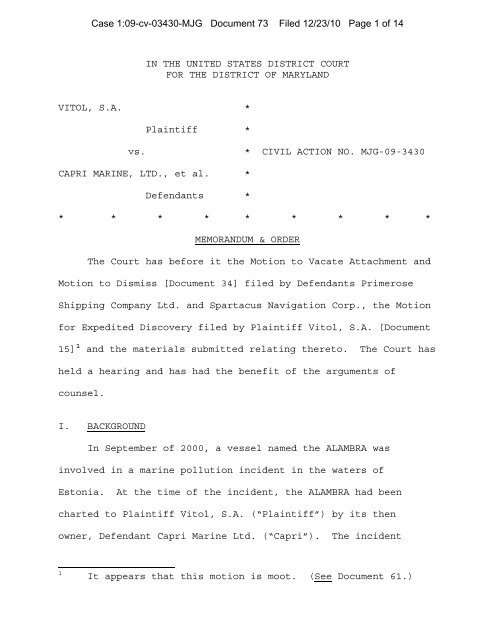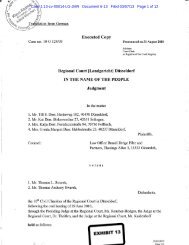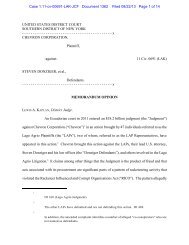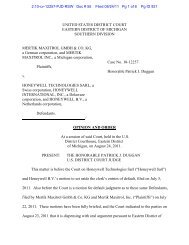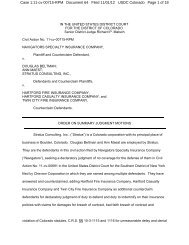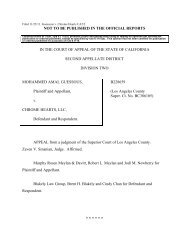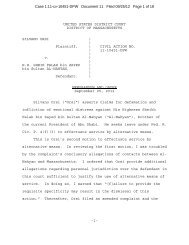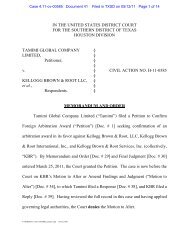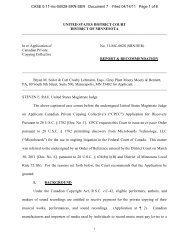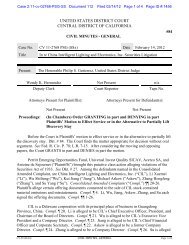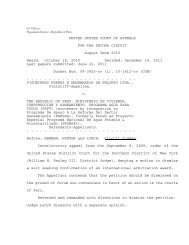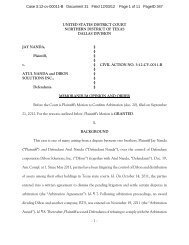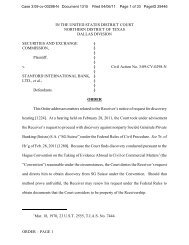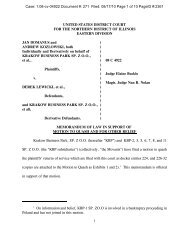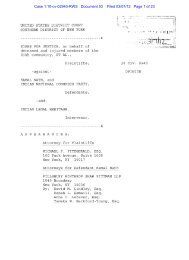Vitol S.A. v. Capri Marine Ltd. - Letters Blogatory
Vitol S.A. v. Capri Marine Ltd. - Letters Blogatory
Vitol S.A. v. Capri Marine Ltd. - Letters Blogatory
You also want an ePaper? Increase the reach of your titles
YUMPU automatically turns print PDFs into web optimized ePapers that Google loves.
IN THE UNITED STATES DISTRICT COURT<br />
FOR THE DISTRICT OF MARYLAND<br />
VITOL, S.A. *<br />
Plaintiff *<br />
vs. * CIVIL ACTION NO. MJG-09-3430<br />
CAPRI MARINE, LTD., et al. *<br />
Defendants *<br />
* * * * * * * * *<br />
MEMORANDUM & ORDER<br />
The Court has before it the Motion to Vacate Attachment and<br />
Motion to Dismiss [Document 34] filed by Defendants Primerose<br />
Shipping Company <strong>Ltd</strong>. and Spartacus Navigation Corp., the Motion<br />
for Expedited Discovery filed by Plaintiff <strong>Vitol</strong>, S.A. [Document<br />
15] 1 and the materials submitted relating thereto. The Court has<br />
held a hearing and has had the benefit of the arguments of<br />
counsel.<br />
Case 1:09-cv-03430-MJG Document 73 Filed 12/23/10 Page 1 of 14<br />
I. BACKGROUND<br />
In September of 2000, a vessel named the ALAMBRA was<br />
involved in a marine pollution incident in the waters of<br />
Estonia. At the time of the incident, the ALAMBRA had been<br />
charted to Plaintiff <strong>Vitol</strong>, S.A. (“Plaintiff”) by its then<br />
owner, Defendant <strong>Capri</strong> <strong>Marine</strong> <strong>Ltd</strong>. (“<strong>Capri</strong>”). The incident<br />
1 It appears that this motion is moot. (See Document 61.)
Case 1:09-cv-03430-MJG Document 73 Filed 12/23/10 Page 2 of 14<br />
resulted in Plaintiff's commencing suit against <strong>Capri</strong> in the<br />
High Court of England for breach of the maritime charter party<br />
contract, vessel unseaworthiness, and marine pollution.<br />
In April of 2005, Plaintiff obtained a money judgment from<br />
the English High Court against <strong>Capri</strong> for roughly $6 million plus<br />
interest (the English Judgment). The current amount owed by<br />
<strong>Capri</strong> to Plaintiff is in excess of $9,300,000. Plaintiff was<br />
unable to satisfy the English Judgment and is seeking to enforce<br />
it against assets belonging to alleged alter egos of <strong>Capri</strong>,<br />
including Defendants Primerose Shipping Co., <strong>Ltd</strong>. (“Primerose”)<br />
and Spartacus Navigation Corp. (“Spartacus”).<br />
On December 23, 2009, Plaintiff filed an Ex Parte<br />
Attachment Order in this Court under Rule B of the Supplemental<br />
Rules for Certain Admiralty and Maritime Claims and Asset<br />
Forfeiture Actions (“Rule B”) to attach any of Defendants’<br />
assets within this District. 2 (See Mot. For Order of Issuance of<br />
Process of Maritime Attachment [Document 2] at 2.) On the same<br />
day, Judge Quarles of this Court issued an Ex Parte Order and<br />
2 Defendants, including <strong>Capri</strong>, are alleged to be<br />
“interrelated groups of entities” (referred to collectively by<br />
the Plaintiff as the “Kalogiratos Group”) and are alleged to be<br />
alter egos of each other so that members of the group are liable<br />
for the English Judgment Plaintiff holds against <strong>Capri</strong>. (Mot.<br />
For Order of Issuance of Process of Maritime Attachment<br />
[Document 2] at 2.) Primerose and Spartacus were not named in<br />
the English action and were not named in the charter party<br />
agreement underlying that action. In fact, neither entity was<br />
in existence at the time of the incident in Estonia. (See Hr’g<br />
Tr. 43:13:-17, Mar. 12, 2010.)<br />
2
Case 1:09-cv-03430-MJG Document 73 Filed 12/23/10 Page 3 of 14<br />
Process of Maritime Attachment and Garnishment [Document 7] for<br />
$9,301591.55. Pursuant to the order, Plaintiff executed an<br />
attachment on the M/V THOR. The THOR is a vessel that was<br />
docked in Baltimore at the time of attachment. The THOR is<br />
owned by Spartacus and managed by Primerose.<br />
As a result of the attachment, Primerose and Spartacus<br />
filed restricted appearances and deposited $9,301591.55 in the<br />
registry of the Court, as substitute security for Plaintiff’s<br />
claim, so as to free the THOR. On December 31, 2009, the THOR<br />
was released [Document 17]. On February 16, 2010, Primerose and<br />
Spartacus filed the instant motion to Vacate the Attachment and<br />
Dismiss the Complaint.<br />
Subsequently, <strong>Capri</strong> applied to the English court to halt<br />
Plaintiff from pursuing its alter ego based claims against<br />
Spartacus and Primerose in this Court and from using documents<br />
in this litigation previously disclosed by <strong>Capri</strong> under order of<br />
the English court. See <strong>Vitol</strong> SA v. <strong>Capri</strong> <strong>Marine</strong> <strong>Ltd</strong>., 2010 WL<br />
666342 (High Court of Justice Queen’s Bench Division Commercial<br />
Court, Mar. 9, 2010). On March 9, 2010, the English court<br />
dismissed <strong>Capri</strong>’s application and deferred to this Court on the<br />
issue of alter ego. Id.<br />
3
II. PROCEDURAL FRAMEWORK<br />
part:<br />
Case 1:09-cv-03430-MJG Document 73 Filed 12/23/10 Page 4 of 14<br />
Supplemental Admiralty Rule E(4)(f)provides, in relevant<br />
Whenever property is arrested or attached, any person<br />
claiming an interest in it shall be entitled to a<br />
prompt hearing at which the plaintiff shall be<br />
required to show why the arrest or attachment should<br />
not be vacated or other relief granted consistent with<br />
these rules. . . .<br />
FED. R. CIV. P. ADM. SUPP. R. E(4)(f).<br />
Rule E(4)(f) satisfies the requirement of due process by<br />
guaranteeing a defendant the ability to “attack the complaint,<br />
the arrest, the security demanded or other alleged deficiency in<br />
the proceedings.” Advisory Committee Notes to Rule E (1985<br />
Amendment). The plaintiff carries the burden at the post-<br />
attachment hearing “to show why the arrest or attachment should<br />
not be vacated or other relief granted consistent with these<br />
rules.” ADM. SUPP. R. E(4)(f).<br />
Defendants seek to vacate the attachment under Rule E(4)(f)<br />
on the ground that the Court lacks admiralty jurisdiction and<br />
seek dismissal under Rule 12(b)(6) of the Federal Rules of Civil<br />
Procedure 3 on the ground that that Plaintiff has not adequately<br />
pleaded an “alter ego” claim against them.<br />
3 See Maersk, Inc. v. Neewra, Inc., 443 F. Supp. 2d 519, 531<br />
(S.D.N.Y. 2006)(Rule 12(b)(6) and not E(4)(f) applicable to<br />
dismissal for failure to plead a claim).<br />
4
Case 1:09-cv-03430-MJG Document 73 Filed 12/23/10 Page 5 of 14<br />
A motion to dismiss under filed pursuant to Federal Rule of<br />
Civil Procedure 12(b)(6) tests the legal sufficiency of a<br />
complaint. A complaint need only contain “a short and plain<br />
statement of the claim showing that the pleader is entitled to<br />
relief, in order to give the defendant fair notice of what the<br />
... claim is and the grounds upon which it rests.” Bell Atl.<br />
Corp. v. Twombly, 550 U.S. 544, 555 (2007) (citations omitted).<br />
When evaluating a 12(b)(6) motion to dismiss, a plaintiff’s<br />
well-pleaded allegations are accepted as true and the complaint<br />
is viewed in the light most favorable to the plaintiff.<br />
However, conclusory statements or a “formulaic recitation of the<br />
elements of a cause of action” will not suffice. Id. A<br />
complaint must allege sufficient facts to “cross ‘the line<br />
between possibility and plausibility of entitlement to relief.’”<br />
Francis v. Giacomelli, 588 F.3d 186, 193 (4th Cir. 2009)<br />
(quoting Twombly, 550 U.S. at 557).<br />
Inquiry into whether a complaint states a plausible claim<br />
is “a context-specific task that requires the reviewing court to<br />
draw on its judicial experience and common sense.” Id. Thus,<br />
if the well-pleaded facts contained within a complaint “do not<br />
permit the court to infer more than the mere possibility of<br />
misconduct, the complaint has alleged – but it has not shown –<br />
that the pleader is entitled to relief.” Id. (quoting Ashcroft<br />
v. Iqbal, -- U.S. --, 129 S. Ct. 1937, 1950 (2009))(internal<br />
5
quotation marks omitted).quotation marks omitted).<br />
III. DISCUSSION<br />
A. Vacate Attachment<br />
1. Jurisdiction<br />
Defendants contend that Plaintiff has not presented a<br />
maritime claim that would properly invoke the Court’s admiralty<br />
jurisdiction. 28 U.S.C.A. § 1333 (West 2010) (granting federal<br />
district courts original jurisdiction over civil admiralty or<br />
maritime actions). The absence of a maritime claim would render<br />
Rule B inapplicable and require vacation of the attachment.<br />
Aqua Stoli Shipping <strong>Ltd</strong> v. Gardner Smith Pty. <strong>Ltd</strong>, 460 F.3d 434,<br />
445 (2d Cir. 2006), abrogated on other grounds by Shipping Corp.<br />
of India <strong>Ltd</strong>. v. Jaldhi Overseas Pte <strong>Ltd</strong>., 585 F.3d 58 (2d Cir.<br />
2009).<br />
The instant case is an action to enforce a foreign monetary<br />
judgment. However, this case would properly invoke this Court’s<br />
admiralty jurisdiction if the English Judgment were based on a<br />
maritime claim. Defendants contend that Plaintiff's claim to<br />
enforce the English Judgment is not a maritime claim because the<br />
judgment was not issued by an admiralty court. The Court does<br />
not agree.<br />
Case 1:09-cv-03430-MJG Document 73 Filed 12/23/10 Page 6 of 14<br />
United States admiralty courts are empowered to enforce the<br />
maritime decrees of foreign admiralty courts. See, e.g.,<br />
6
Case 1:09-cv-03430-MJG Document 73 Filed 12/23/10 Page 7 of 14<br />
Penhallow v. Doane’s Adm’rs, 3 U.S. (3. Dall.) 54 (1795); Int’l<br />
Sea Food <strong>Ltd</strong>. v. M/V Campeche, 566 F.2d 482, 484 (5th Cir.<br />
1978). Thus, admiralty jurisdiction exists over a claim to<br />
enforce a foreign judgment that is itself based on a maritime<br />
claim. See Victrix S.S. Co., S.A. v. Salen Dry Cargo A.B., 825<br />
F.2d 709, 713 (2d Cir. 1987).<br />
It is true that the English Judgment was entered by the<br />
Commercial Court of the High Court of Justice Queen’s Bench<br />
Division and not by the British Admiralty Court. Nevertheless,<br />
as stated in the expert opinions of English barristers presented<br />
by both sides, the underlying claim was of a maritime nature<br />
and, pursuant to British procedure, could properly have been<br />
brought in either the Admiralty Court or the Commercial Court.<br />
(See Decl. of Julia Amanda Dias Q.C. in Supp. of Mot. to Vacate<br />
Attachment and Dismiss Compl. 18-22, 26; Resp. Decl. of Luke<br />
Arthur Parsons Q.C. 13-21.) There appears to be no valid<br />
basis to conclude that the underlying claim would lose its<br />
maritime character by virtue of the Plaintiff's choice of forum.<br />
In other words, inasmuch as the underlying case was a maritime<br />
claim presented to a court that had jurisdiction over maritime<br />
claims, the Commercial Court was an admiralty court with respect<br />
to the English Judgment. See Good Challenger Navagante S.A. v.<br />
Metalexportimport S.A., R No. 06-CV-1847, 2006 U.S. Dist. LEXIS<br />
97920, at *2 (S.D.N.Y. July 24, 2006)(upholding a Rule B<br />
7
Case 1:09-cv-03430-MJG Document 73 Filed 12/23/10 Page 8 of 14<br />
attachment in an action to enforce a judgment of the Commercial<br />
Court of the High Court of Justice Queen’s Bench Division).<br />
This Court, therefore, holds that it has jurisdiction<br />
over the instant case pursuant to 28 U.S.C. § 1333.<br />
2. Propriety of Attachment<br />
Rule B of the Supplemental Rules for Admiralty or Maritime<br />
Claims and Asset Forfeiture Actions provides, in relevant part:<br />
If a defendant is not found within the district when a<br />
verified complaint praying for attachment and the<br />
affidavit required by Rule B(1)(b) are filed, a<br />
verified complaint may contain a prayer for process to<br />
attach the defendant’s tangible or intangible personal<br />
property – up to the amount sued for – in the hands of<br />
the garnishees named in the process.<br />
FED. R. CIV. P. ADM. SUPP. R. B(1)(a). This rule was designed to<br />
preserve the traditional maritime remedy of attachment and<br />
garnishment. See Advisory Comm. Notes to Rule B (1966<br />
Adoption). This Court has observed that “Rule B was intended as<br />
a device enabling an admiralty plaintiff to establish<br />
jurisdiction over a defendant that may be peripatetic and hard<br />
to locate and serve.” Emerald Equip. Leasing, Inc. v. Sea Star<br />
Line, LLC, No. 09-2808, 2009 U.S. Dist. LEXIS 108635, at *3-4<br />
(D. Md. November 20, 2009).<br />
Rule B attachment is an extraordinary maritime remedy.<br />
Thus, the burden is on the plaintiff to show that such<br />
attachment is needed to obtain jurisdiction over the defendant<br />
8
Case 1:09-cv-03430-MJG Document 73 Filed 12/23/10 Page 9 of 14<br />
or sufficient security for a potential judgment in the<br />
underlying action. See Good Challenger Navagante S.A. v.<br />
Metalexportimport S.A., No. 06-CV-1847, 2006 U.S. Dist. LEXIS<br />
97920, at *2 (S.D.N.Y. July 24, 2006). To meet this burden, the<br />
plaintiff must establish that:<br />
1) it has a prima facie admiralty claim against the<br />
defendant; 2) the defendant cannot be found within the<br />
district; 3) the defendant’s property may be found<br />
within the district; and 4) there is no statutory or<br />
maritime law bar to the attachment.<br />
Aqua Stoli Shipping <strong>Ltd</strong> v. Gardner Smith Pty. <strong>Ltd</strong>, 460 F.3d 434,<br />
445 (2d Cir. 2006).<br />
Plaintiff has satisfied all of these elements. However,<br />
Defendants contend that Rule B cannot be used post-judgment to<br />
attach assets.<br />
It is true that a maritime attachment is a “prejudgment<br />
mechanism used by parties in admiralty cases to secure<br />
jurisdiction over an absent party and to obtain security for<br />
potential judgment where the absent party's assets are<br />
transitory.” Williamson v. Recovery <strong>Ltd</strong>. P'ship, 542 F.3d 43,<br />
48 (2d Cir. 2008). However, the practice of obtaining Rule B<br />
attachment in aid of recognition and enforcement of a foreign<br />
admiralty judgment is regularly permitted. In essence, the<br />
attachment is “prejudgment” with respect to the instant action.<br />
See, e.g., Int’l Sea Food <strong>Ltd</strong>. v. M/V Campeche, 566 F.2d 482,<br />
485 (5th Cir. 1978) (upholding Rule B attachment in an action to<br />
9
Case 1:09-cv-03430-MJG Document 73 Filed 12/23/10 Page 10 of 14<br />
enforce a judgment of a foreign court sitting in admiralty);<br />
Good Challenger, 2006 U.S. Dist. LEXIS 97920, at *2 (denying<br />
motion to vacate Rule B attachment in an action to enforce the<br />
judgment of an English court enforcing an arbitration award);<br />
Pink Goose (Cayman) <strong>Ltd</strong>. v. Sunway Traders LLC, No. 08-CV-2351,<br />
2008 WL 4619880 (S.D.N.Y. Oct. 17, 2008) (upholding Rule B<br />
attachment in an action to confirm a foreign arbitral award).<br />
Therefore, the Court holds that the Rule B attachment was<br />
properly effected.<br />
3. Dismissal<br />
a. Contractual Bar<br />
Primerose and Spartacus contend that Plaintiff was required<br />
to pursue its alter ego claims in an English court and pursuant<br />
to English law. (Defs’ Mem. in Supp. of Mot. to Dismiss<br />
[Document 33] at 33.)<br />
The underlying charter party agreement between Plaintiff<br />
and <strong>Capri</strong> contained a law and jurisdiction clause that required<br />
that all disputes arising out of the contract be determined by<br />
English law. (Lennon Decl. 5, Ex. 2.) However, as the<br />
English Court stated in its recent decision:<br />
<strong>Vitol</strong>’s assertions against Spartacus and Primerose are<br />
not in any event based upon the charter party. They<br />
are based upon the judgment against <strong>Capri</strong>. . . . The<br />
rights and obligations which were once governed by the<br />
charter have merged into the judgment. . . . They<br />
10
Case 1:09-cv-03430-MJG Document 73 Filed 12/23/10 Page 11 of 14<br />
would rather have expected that any question as to<br />
enforcement would be dealt with in the courts of the<br />
forum in which was found an asset against which<br />
enforcement was attempted and determined according to<br />
the applicable local law.<br />
<strong>Vitol</strong> SA v. <strong>Capri</strong> <strong>Marine</strong> <strong>Ltd</strong>., 2010 WL 666342 (High Court of<br />
Justice Queen’s Bench Division Commercial Court, Mar. 9, 2010);<br />
(Document 39-1). The Court agrees and holds that Plaintiff is<br />
not barred from pursuing its alter ego claims in this Court.<br />
b. Adequacy of Complaint<br />
Plaintiff’s factual alter ego allegations are set forth in<br />
a sealed declaration of Plaintiff’s English solicitor, which was<br />
incorporated by reference in the Verified Complaint.<br />
Plaintiff’s alter ego claims are founded primarily upon<br />
allegations relating to the “interconnectedness of the<br />
Defendants.” (See Decl. of Peter James John Reid at 18.) With<br />
respect to Spartacus and Primerose, Plaintiff’s solicitor<br />
suggests that Gerassimos Kalogiratos “may be a corporate officer<br />
of Spartacus,” because the THOR is subject to a mortgage which<br />
was signed by Gerassimos Kalogiratos as “attorney-in-fact” on<br />
behalf of Spartacus. (See Reid Decl. at 85.) Plaintiff also<br />
alleges the geographical proximity of the Greek offices of<br />
Primerose and Defendants Lassi Shipping Co. <strong>Ltd</strong>, and Starlady<br />
<strong>Marine</strong> <strong>Ltd</strong>. and notes that photographs show similar funnel<br />
markings on the various vessels owned by Defendants. (See Reid<br />
11
Decl. at 89-91, Exs. 33-34; Reid Response Decl. Ex. 5.) The<br />
Court finds these allegations insufficient to state plausible<br />
alter ego liability claims against Defendants. More is<br />
required.<br />
Case 1:09-cv-03430-MJG Document 73 Filed 12/23/10 Page 12 of 14<br />
For example, in Wajilam Exps. (Singapore) Pte. <strong>Ltd</strong>. v. ATL<br />
Shipping <strong>Ltd</strong>., 475 F. Supp. 2d 275, 283 (S.D.N.Y. 2006), the<br />
plaintiff alleged that “funds payable to [defendant] are<br />
routinely diverted to [the alleged alter ego] in disregard of<br />
the companies’ separate corporate forms.” The plaintiff further<br />
alleged that there was charter party between the defendant and a<br />
third party and an invoice that directed funds due under the<br />
charter party be paid to the alleged alter ego. Id. The<br />
district court found these allegations sufficient to establish a<br />
prima facie alter ego claim based on disregard of the corporate<br />
form. Id. at 284-85.<br />
In contrast, in Williamson v. Recovery <strong>Ltd</strong>. P’ship, 542<br />
F.3d 43, 53 (2d Cir. 2008), cert denied, 129 S.Ct. 946 (2009),<br />
the Second Circuit, agreeing with the district court, concluded<br />
that the plaintiff had not stated a prima facie admiralty claim<br />
where the alter ego allegations were supported only by<br />
generalized allegations in an attorney-sworn affidavit and<br />
documentation of common business addresses and management. Id.<br />
As a result, the district court’s decision to vacate the<br />
attachments against those defendants was upheld. Id.; see also<br />
12
Kola Shipping <strong>Ltd</strong>. v. Shakti Bhog Foods <strong>Ltd</strong>., No. 08-8817, 2009<br />
U.S. Dist. LEXIS 14392, at *5 (S.D.N.Y. Feb. 24, 2009)<br />
(declining to issue Rule B attachment against new defendants<br />
where alter ego allegations were “founded on generalized<br />
allegations in the attorney-verified amended complaint of common<br />
management and ownership and a number of instances in which one<br />
defendant acted as a guarantor for another.”).<br />
While the allegations presented by Plaintiff in the<br />
Verified Complaint and Reid Declaration certainly suggest that<br />
the various defendants are “interconnected” in some manner,<br />
Plaintiff has presented no allegations of facts showing actual<br />
domination or control of Primerose and Spartacus by <strong>Capri</strong>, the<br />
judgment debtor.<br />
Accordingly, the Court concludes that it must dismiss the<br />
action as presently pleaded. However, after submission of the<br />
instant motion, Plaintiff has been provided with certain<br />
documents, including bank statements, which might enable it to<br />
present a viable amended complaint. (See Letter from Lawrence J.<br />
Kahn, September 23, 2010 [Document 67].) Therefore, the Court<br />
will defer the entry of judgment so as to enable Plaintiff to<br />
seek leave to file an amended complaint if circumstances should<br />
warrant.<br />
Case 1:09-cv-03430-MJG Document 73 Filed 12/23/10 Page 13 of 14<br />
13
Case 1:09-cv-03430-MJG Document 73 Filed 12/23/10 Page 14 of 14<br />
IV. CONCLUSION<br />
For the foregoing reasons:<br />
1. Defendants’ Motion to Vacate Attachment and Motion<br />
to Dismiss [Document 34] is GRANTED.<br />
2. Plaintiff’s Motion for Expedited Discovery [Document<br />
15] is DENIED AS MOOT.<br />
3. The Court shall defer the entry of Judgment until<br />
January 31, 2011, so that Plaintiff may, by that<br />
date, seek leave to amend the complaint.<br />
SO ORDERED, on Thursday, December 23, 2010.<br />
14<br />
/s/______________<br />
Marvin J. Garbis<br />
United States District Judge


